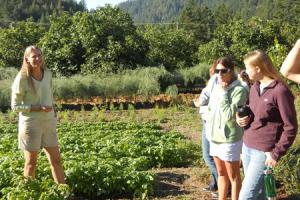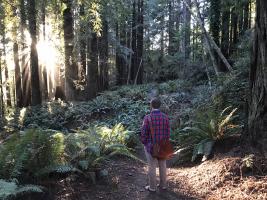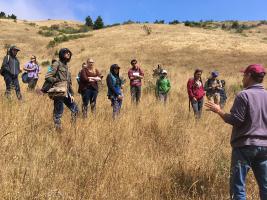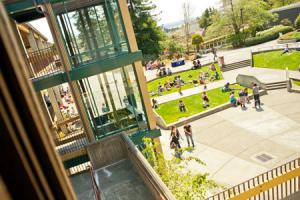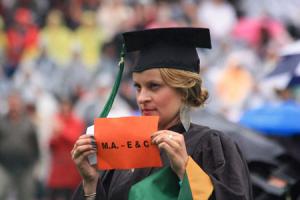Fall 2014
Unless otherwise noted, events are 5:30pm-7:00pm Thursdays in BSS 166 *
September 4
Belinda Batten
“Catching the Wave and Rising with the Tides: Marine Renewable Energy at NNMREC”watch full presentation
Dr. Belinda Batten directs the Northwest National Marine Renewable Energy Center (NNMREC), a collaboration between Oregon State University and the University of Washington supporting wave, tidal and offshore wind energy research, development and testing for the United States.
Dr. Batten is a Professor of Mechanical Engineering at Oregon State University. Her research interests include computational methods for control and optimization, mathematical modeling, and dynamics and control of wave energy devices. Batten’s research has been supported by the Defense Advanced Research Projects Agency, the Department of Defense, the National Science Foundation, and the Department of Energy.
September 11
Peter Alagona
“Forty Years of Endangered Species: Conflict and Conservation in California and Beyond”watch full presentation
Peter S. Alagona is an Associate Professor of History, Geography, and Environmental Studies at the University of California, Santa Barbara (UCSB). He earned his Ph.D. at UCLA, and completed postdoctoral fellowships at Harvard and Stanford. He is the recipient of several awards, including a National Science Foundation CAREER grant and the Harold J. Plous Award for UCSB’s most outstanding junior faculty member. Alagona is the author of more than three-dozen publications on the histories of land use, natural resource management, environmental politics, and ecological science in California and the American West—including After the Grizzly: Endangered Species and the Politics of Place in California (UC Press, 2013).
September 18
Ron Reed and Kari Norgaard
“The Politics of Fire and the Social Impacts of Fire Exclusion on the Klamath” watch full presentation
Ron Reed is a traditional Karuk dipnet fisherman, spiritual leader, and the Cultural Biologist for the Karuk Tribe. Ron comes from a long and prominent family of traditional spiritual leaders and cultural practitioners, and is the father of six children. As the Karuk Tribe’s Cultural Biologist, Ron has been an important tribal spokesperson who has communicated the cultural and health impacts of current river and forest mismanagement to audiences around the world. He also works at home to restore Karuk culture and society through reconnecting people, especially tribal youth, to the natural world. His work has been featured in prominent news outlets around the world including National Geographic, National Public Radio, High Country News and many more.
Ron has served as a member of the Environmental Justice Task Force, California Environmental Protection Agency, and in 2007 was one of half a dozen delegates from California to the first U.S. Social Forum in Atlanta. In addition to the research described here, Ron currently heads up the Karuk portion of a significant intertribal USDA grant on Food Security.
Kari Marie Norgaard is Associate Professor of Sociology and Environmental Studies at University of Oregon. Her research on climate denial, tribal environmental justice and gender and risk has been published in Sociological Forum, Gender and Society, Sociological Inquiry, Organization and Environment, Rural Sociology, Race, Gender & Class, and other journals, as well as by the World Bank. Her first book, Living in Denial: Climate Change, Emotions and Everyday Life, was published by MIT Press in 2011. Norgaard is recipient of the Pacific Sociological Association’s Distinguished Practice Award for 2005.
Ron and Kari have been working closely together since 2003 conducting important policy-relevant research on tribal health and social impacts of environmental decline. In 2004 their report The Effects of Altered Diet on the Karuk Tribe was submitted to the Federal Energy Regulatory Commission as part of the opposition to the relicensing of the Klamath river dams. Their action represented the first time a tribe had claimed that a dam had given their people an artificially high rate of diabetes and other diet related disease. This work was covered in a front page story in the Washington Post as well as many other national and regional outlets. Since that time Ron and Kari have continued to work on policy driven research projects including work that established Tribal Cultural and Tribal Subsistence beneficial uses in the TMDL water quality process in California for the first time. Together they have co-supervised over a dozen undergraduate theses and have several co-authored publications.
October 2
Sam Arons
“Scaling Renewable Energy: A Perspective from Google”
For the past seven years, Sam has held a variety of roles at Google focused on sustainability and renewable energy. He has led a number of initiatives on the sustainability front including calculating Google’s global carbon footprint and implementing a feature in the Google Finance product to show companies’ carbon scores. Sam is currently a member of the Global Infrastructure team at Google where, as part of the team’s mission to execute a global data center strategy, he helps lead the development and implementation of the company’s global renewable energy strategy. Key efforts of the team include managing the company’s energy portfolio and sourcing as much renewable energy as possible to power Google’s datacenters. Recent examples of the team’s success include a negotiating a utility agreement for up to 407 MW of wind power in Iowa, closing a long-term power purchase agreement for 239 MW of wind power in the Texas panhandle, and signing a 72 MW wind power purchase agreement in Sweden to supply Google’s Hamina, Finland datacenter.
Prior to joining Google, Sam earned a B.A. in Physics from Williams College and an M.S. in Energy and Resources from UC Berkeley, where his research focused on wind energy and plug-in vehicles, respectively.
October 9
Joan Ogden
“A Portfolio Approach to Sustainable Transportation”
Dr. Joan Ogden is Professor of Environmental Science and Policy at the University of California, Davis and Director of the Sustainable Transportation Energy Pathways Program at the campus’s Institute of Transportation Studies. Her primary research interest is technical and economic assessment of new energy technologies, especially in the areas of alternative fuels, fuel cells, renewable energy and energy conservation. Her recent work centers on the use of hydrogen as an energy carrier, hydrogen infrastructure strategies, and applications of fuel cell technology in transportation and stationary power production. She has served on California state committees on hydrogen and greenhouse gas issues, the USDOE Hydrogen Technical Advisory Committee, the IPCC panel on Renewable Energy, and on National Academies committees assessing hydrogen fuel cell and plug-in hybrid vehicles. She holds a B.S. in mathematics from the University of Illinois, and a Ph.D. in theoretical physics from the University of Maryland.
Making a transition to a sustainable transportation system requires fast-moving success on three fronts: improved energy efficiency, reduced travel demand, and adoption of low carbon fuels that can be produced from widely available primary sources. There are technical options for moving closer to each of these goals, including adoption of alternative fuels such as electricity, biofuels, hydrogen. By combining these approaches, recent studies suggest it would be technically feasible to significantly reduce transportation-related greenhouse gas (GHG) emissions and diversify away from dependence on petroleum over the next few decades. But actual progress towards these goals has been slower than the technical potential suggests, because of an array of complex transition issues. In this talk, Ogden will examine the options for meeting sustainability and energy security goals in the transport sector, and discuss barriers to their implementation.
November 6
Matt Johnson
“Reconciling Agriculture & Wildlife Conservation: Examples with Coffee Farmers and Birds in Jamaica, Kenya, and India” watch full presentation
Matt Johnson is a professor of Wildlife at Cal Poly Humboldt, where he has taught since 1999. He studies wildlife conservation, including the relationships between wildlife habitat and human livelihood. Recent interests revolve around the integration of agriculture and biodiversity. His work has also involved the interdisciplinary valuation of ecosystem services provisioned by wildlife. He lives in Freshwater with his wife and two kids.
November 13
Jesse Abrams
“The Importance of Communities of Place and Interest to the Sustainability of Forest-based Bioenergy Development” watch full presentation
Jesse Abrams is a Postdoctoral Research Associate at the Ecosystem Workforce Program, Institute for a Sustainable Environment, University of Oregon. His current research includes investigating the social and political dimensions of bioenergy development in six countries across the Americas, studying the impact of state and federal biomass policy on business decision-making and innovation, and researching the institutional context for community fire resiliency. His past work included research on amenity-driven land ownership change, the development of community-based public lands governance models, and public opinions of forest restoration practices. He is co-editor of the book Human Dimensions of Ecological Restoration: Integrating Science, Nature, and Culture (Island Press, 2011). Abrams holds Ph.D. and M.S. degrees in Forest Resources from Oregon State University and a B.A. in Environmental Studies from New College of Florida.
November 20
Trevor Houser, Partner, Rhodium Group
“China’s Energy Future: Domestic Drivers and Global Consequences”
Trevor Houser is a partner with the Rhodium Group (RHG) and leads the firm’s energy and natural resources work.RHG combines policy experience, quantitative economic tools and on-the-ground research to analyze disruptive global trends. Houser’s work supports the investment management, strategic planning and policy needs of RHGclients in the financial, corporate and government sectors.
Houser is also a visiting fellow at the Peterson Institute for International Economics in Washington, an adjunct lecturer at the City College of New York, and a visiting fellow at the school’s Colin Powell Center for Policy Studies. He is a member of the Council on Foreign Relations and the National Committee on US-China Relations and serves on the Advisory Board of Center for US-China Relations at the Asia Society.
During 2009, Houser left RHG temporarily to serve as Senior Advisor to the US State Department where he worked on a broad range of international energy, natural resource and environmental policy issues. While in government, he negotiated seven bilateral US-China energy agreements, including the US-China Shale Gas Initiative and the establishment of the US-China Clean Energy Research Center. Houser also served as a US climate change negotiator through the Copenhagen conference in 2009.
Houser speaks regularly on international energy market and policy trends at the Peterson Institute for International Economic, the Aspen Institute, the Brookings Institute, the Council on Foreign Relations, the Center for Strategic and International Studies, the World Affairs Council, the Energy Information Administration’s annual conference, OPEC-IEA joint workshops and a range of academic and private sector events. He has testified before the House Energy and Commerce Committee, the House Select Committee on Energy Independence and Global Warming, the US Helsinki Commission and the US-China Economic and Security Review Commission.

